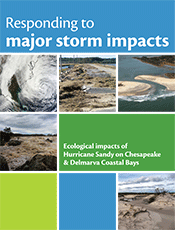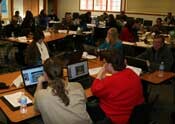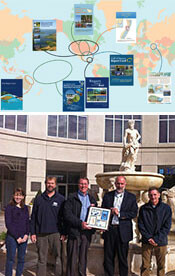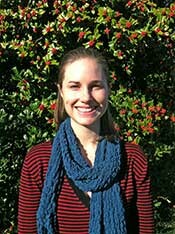
Science for Environmental Management course
Part of the MEES Spring Semester 2013 program, MEES 698Y: Special Topics in Marine-Estuarine-Environmental Sciences is being taught by Don Boesch and Bill Dennison. This 3 credit course addresses the role of science in environmental management, using theory, case studies, practitioner perspectives, and current environmental issues as topics. Students will develop synthesis and science communication skills through tutorials, readings, and assignments. Students will be trained to produce conceptual diagrams, media releases, and briefing papers.Responding to major storm impacts: ecological impacts of Hurricane Sandy on Chesapeake and Delmarva Coastal Bays
 The National Fish and Wildlife Foundation established a Hurricane Sandy Wildlife Response Fund to conduct a rapid assessment of the ecological impacts of Hurricane Sandy from North Carolina to Rhode Island, with emphasis on habitats and associated wildlife. Scientists from various organizations including government agencies, non-government organizations, and academic institutions provided data and information about Hurricane Sandy in relation to both Chesapeake Bay and the Delmarva Coastal Bays, which was then integrated into a 20-page summary report. The goal of this summary report is to effectively communicate the impacts of Hurricane Sandy to U.S. congressional leadership and the broader public, with recommendations for mitigation activities to ameliorate the impacts of future storm events.
The National Fish and Wildlife Foundation established a Hurricane Sandy Wildlife Response Fund to conduct a rapid assessment of the ecological impacts of Hurricane Sandy from North Carolina to Rhode Island, with emphasis on habitats and associated wildlife. Scientists from various organizations including government agencies, non-government organizations, and academic institutions provided data and information about Hurricane Sandy in relation to both Chesapeake Bay and the Delmarva Coastal Bays, which was then integrated into a 20-page summary report. The goal of this summary report is to effectively communicate the impacts of Hurricane Sandy to U.S. congressional leadership and the broader public, with recommendations for mitigation activities to ameliorate the impacts of future storm events.
Multiple science communication courses taught in December
 A full, 2.5-day science communication course was taught at the Delaware National Estuarine Research Reserve in Dover, Delaware in mid-December. The course included close to 30 participants, mostly from the Delaware Department of Natural Resources and Environmental Control. In contrast to other courses, this course had a lot of land-based research and restoration topics that were a focus of the participants' projects. A one-day science communication course was taught at the University of Maryland Eastern Shore as part of the Living Marine Resources Cooperative Science Center, a NOAA-sponsored partnership. The course was attended by 23 students and focused on conceptual diagrams and PowerPoint presentation skills.
A full, 2.5-day science communication course was taught at the Delaware National Estuarine Research Reserve in Dover, Delaware in mid-December. The course included close to 30 participants, mostly from the Delaware Department of Natural Resources and Environmental Control. In contrast to other courses, this course had a lot of land-based research and restoration topics that were a focus of the participants' projects. A one-day science communication course was taught at the University of Maryland Eastern Shore as part of the Living Marine Resources Cooperative Science Center, a NOAA-sponsored partnership. The course was attended by 23 students and focused on conceptual diagrams and PowerPoint presentation skills.
EcoCheck transition
 EcoCheck was formed in 2004 as a partnership between UMCES and NOAA to develop ecological forecasting and environmental reporting capacity in Chesapeake Bay. It has produced annual report cards, ecological forecasts, summer tracking, and summer review for Chesapeake Bay. EcoCheck staff led the effort on several other projects including a handbook for effective coastal ecosystem assessment, development of the National Estuarine Eutrophication Assessment, and formation of the Mid-Atlantic Tributary Assessment Coalition (MTAC). EcoCheck has been actively promoting the use of environmental report cards globally in locations such as the Great Barrier Reef, the South Pacific islands, Gulf of Mexico, and the Mississippi River basin. The next chapter for EcoCheck includes relocation of staff to the UMCES Annapolis Office and the main IAN building in Cambridge, MD. Future projects include a major revision of the Chesapeake bay report card, various other report card projects, and support for NOAA's Coral Reef Conservation Program.
EcoCheck was formed in 2004 as a partnership between UMCES and NOAA to develop ecological forecasting and environmental reporting capacity in Chesapeake Bay. It has produced annual report cards, ecological forecasts, summer tracking, and summer review for Chesapeake Bay. EcoCheck staff led the effort on several other projects including a handbook for effective coastal ecosystem assessment, development of the National Estuarine Eutrophication Assessment, and formation of the Mid-Atlantic Tributary Assessment Coalition (MTAC). EcoCheck has been actively promoting the use of environmental report cards globally in locations such as the Great Barrier Reef, the South Pacific islands, Gulf of Mexico, and the Mississippi River basin. The next chapter for EcoCheck includes relocation of staff to the UMCES Annapolis Office and the main IAN building in Cambridge, MD. Future projects include a major revision of the Chesapeake bay report card, various other report card projects, and support for NOAA's Coral Reef Conservation Program.
Welcome to Catherine Ward
 Catherine Ward has recently joined IAN as a Science Communication Intern. She obtained her Masters in Environmental Science at Rhodes University in South Africa and looks forward to learning about science communication techniques with IAN. Before IAN, Catherine interned with Worldwatch's Food and Agriculture program in Washington, D.C., and volunteered for the Cheetah Conservation Fund based in Alexandria, VA. In her free time, Catherine enjoys hiking, browsing through farmers' markets, and traveling to new places.
Catherine Ward has recently joined IAN as a Science Communication Intern. She obtained her Masters in Environmental Science at Rhodes University in South Africa and looks forward to learning about science communication techniques with IAN. Before IAN, Catherine interned with Worldwatch's Food and Agriculture program in Washington, D.C., and volunteered for the Cheetah Conservation Fund based in Alexandria, VA. In her free time, Catherine enjoys hiking, browsing through farmers' markets, and traveling to new places.

